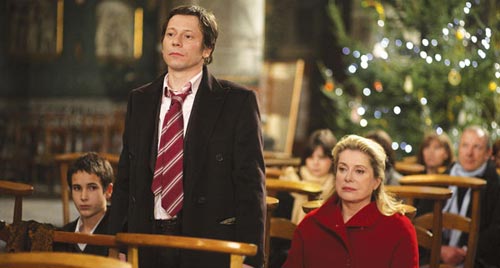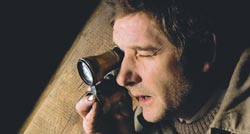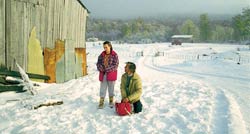
Fridays are normally reserved here at Daily Plastic for new reviews. And unlike the last few weeks when almost nothing good was released, there are some interesting possibilities for today. But we’re having too much fun in Toronto to wax poetic about Burn after Reading and Righteous Kill. But to make it up to you, we’re posting TWO days of TIFF reflections. Cuz you really didn’t want to work today anyway, did’ya? This is Day 7, while Day 6 (due to the brilliance of blogging technology) is farther below.
Today was a strong day, with three winners out of five and only one bad film. The best was Arnaud Desplechin’s A Christmas Tale. Festival co-director Piers Handling introduced it as a movie “about a dysfunctional family par excellence,†and he’s exactly right. The mother Junon (a wonderfully cold Catherine Deneuve) is openly hostile to her son Henri (Mathieu Amalric, delightfully unstable), whom she blames for her eldest son’s death at the age of six. No matter that Henri was still in diapers at the time. Elizabeth (Anne Consigny) detests Henri as well and even went so far as to banish him from the family. Elizabeth’s son Paul is in the midst of a nervous breakdown. And I could go on and on. Only the patriarch Abel (Jean-Paul Roussillon as the doughy moral center of the film) and the youngest son Ivan seem to get along with everyone, but maybe not.
The whole clan--including girlfriends, wives, children, a cousin and even the “partner†of Abel’s mother--come together one Christmas weekend to celebrate ... Junon’s need of a bone marrow transplant. What follows is deliciously off-kilter and not a little mean. Maybe it’s all the high-minded films I’ve been seeing here at Toronto, but watching this cold-hearted family fight and then kind of make up was hugely entertaining. The whole ensemble is brilliant (special mention of Emmanuelle Devos as a gleeful outsider), and Desplechin’s messy (but controlled messy) direction throws it all into a blender. My favorite moments included a Christmas play written by twin boys, a fist fight between Elizabeth’s husband and Henri, and a Christmas Eve mass. I have no idea what the Vertigo references are doing here because I stopped thinking at about the 45-minute mark and just let the emotional side of my brain enjoy the show.
Not much can be said for Four Nights with Anna. It’s the return of Polish director Jerzy Skolimowski, but as with Three Monkeys I’m wondering why a brilliant filmmaker would focus on this material. It’s about an emotionally stunted middle-aged man who has a fascination with the woman across the yard. He spies on her at night. Then, through the help of some crushed sleeping pills in her sugar, he sneaks into her room while she’s sleeping. For four nights, but then you probably guessed that already.
The film is beautifully shot and utterly empty. Yes, voyeurism. Cue the obligatory point-of-view shots. My friend Garth mentioned that it was slight. So slight it evaporates, I replied. Yet the audience doesn’t escape without witnessing two rapes. Hurrah, European cinema.
There are no rapes in the Dardenne brothers’ latest movie, thank heavens. Not that we’d expect it from them, but The Silence of Lorna does feature some seedy characters plotting awful things. In the middle is Lorna, an Albanian woman who’s come to Belgium and married a junkie to obtain her Belgian ID card. The plan, as we learn early on, is that at some point soon she’ll stop being married to the junkie and then marry a Russian who’s willing to pay handsomely to receive his Belgian papers. How Lorna will stop being married to the junkie provides the crux of the film.
I’m not as big a Dardenne fan as many of my friends; for my money, Rosetta is their only truly great film. But I loved the first half of this one, as we learn about Lorna and her situation. While she’s hardly a paragon of virtue, she’s uncomfortable with what her Albanian co-horts are up to. Still, what can she do? Unfortunately, the film's second half takes a couple left turns that I neither expected nor quite understood. Why is she doing that?, I asked myself and couldn’t come up with a satisfactory answer. Then in the last act, the brothers Dardenne paint themselves into a corner, from which there is no satisfactory escape.
Another film whose ending can be questioned is Linha de Passe. From the Brazilian directors Walter Salles and Daniela Thomas, it’s like Rocco and His Brothers updated to contemporary Sao Paolo. Here, Cleuza works as a maid and somewhat raises her four boys with another child on the way. The four range in age from 11 to 18 and embody various aspects of Brazilian society. But I disagree with those critics who find the boys to be one-note characters. Yes, each one has a dominant trait (soccer player, Christian believer, lothario, boy in search of father), but they’re more nuanced than that. The churchgoer struggles with how to relate to his family and his own doubts. The youngest is obsessed with buses and how that might form a substitute for the dad he’s never known. And the lothario has a little baby for which he’s trying to find money. Whether that’s legal or otherwise, we’ll have to find out.
Linha de Passe is fairly typical arthouse fare, though Salles and Thomas show some flair. An opening sequence linking soccer crowds and church congregations is particularly nice, but the movie also intercuts between the various storylines without feeling gimmicky. I also like how the movie shows the struggles of the working poor, how you can be working and yet still just one bad break away from disaster. A feeling of dread hangs over the last part of the film, not because it’s being manipulative but because we’ve come to care for these characters and wonder if the proverbial “other shoe†will drop.
But back to that ending. Without giving anything away, let’s just say it ends unexpectedly. And while I often like that narrative decision, I’m not sure it’s provocative here or simply a cop-out. You’ll have to decide for yourself.
Most people won’t decide anything about Liverpool because they won’t see this slow-moving drama from Argentinean director Lisandro Alonso, and that’s kind of a shame. The movie is simple and gorgeous, with Alonso’s trademark long takes focusing initially on a sailor heading home for the first time in decades, and then his hometown and family. Alonso creates scenes of striking beauty, particularly in the way he uses the sea and then the snowy mountains as backdrops.
Random things I enjoyed:
1) The movie opens with a kick-ass rock song that plays over the entire credits and nothing else. It reminds me of the opening of the Nathaniel Dorsky films, except the opposite. Dorsky opens with a long stretch of darkness and silence to set the mood. Alonso opens with darkness and blaring music to set the mood. Both work.
2) Alonso has a particularly cool way with windows, so that you can see outside clearly. This creates a deeper sense of space on the screen as well as effective contrasts between light and dark.
3) The movie also has a wonderful way of creating boundaried space, with walls and hills and even goalposts framing in our characters. Part of this has to do with the long shots Alonso uses, so that the character is part of a larger environment. But it’s still a strong sense of being closed in at the same time things can be very open.
4) The contrast between indoors and outdoors is a major theme (see #2), though I honestly don’t know how to unpack that. More stuff to chew on is always welcome.
5) Finally, and most importantly, the movie has a lovely ending, completing the transition from one character to another so seamlessly I didn’t realize it was happening until I found my sympathies had shifted. And then a closeup in a movie devoid of them, reminding us that it’s a powerful tool that should be saved for exactly the right time.
That's the last of the five-film days. Tomorrow brings two movies that made me laugh and one that left me cursing. A note to our loyal Plastic readers: we don't usually post over the weekend, but we're going to try to make an exception this time, just to catch up with TIFF before people stop caring.








J. Robert, again, thanks for your impressions. I agree with you about Lorna's Silence, the set-up was fascinating for me and the particular quality of her "prostitution" revealing. The theme of the colonization of women's bodies by prevailing commerce is one of my favorite themes, for its simplicity and its ubiquity. I was equally fascinated by the film's central elision where--despite her best efforts--Lorna is proven powerless. The film's final sequence devolved into Looney Lorna talking to herself and acting quite irrationally. Sure she has been driven mad by a guilty conscience, but such melodrama stands out so pronounced because the Dardennes have built a reputation by avoiding such facile devices. Also, I kept getting distracted by her resemblance to Ellen Page. Especially when she became pregnant, I kept flashing on Juno. Looney Lorna or Looney Juno? Your pick.
I like your formalistic assessment of Liverpool, which is quite a strong film I think. I appreciated how spatiality informs and shapes the film throughout. Michael Sicinski, in his dispatch to The Greencine Daily has best expressed for me the play between internal and external spaces which you're referencing. I love that Alonso's camera is so still and observant.